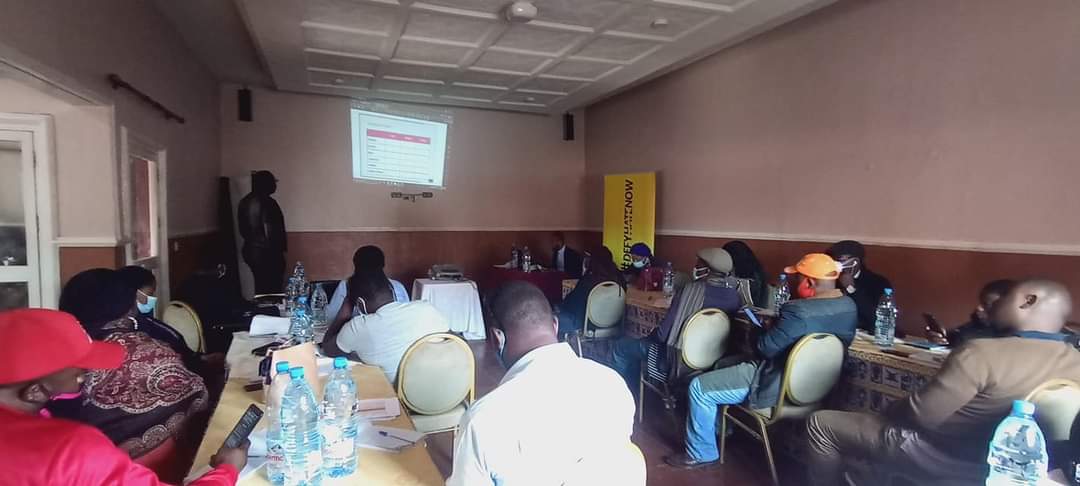Gathered for 3 days in a Media4Peace training dubbed "Catalyzing Media for Peace and Justice in Cameroon", some 25 journalists, bloggers, and freelancers from the Northwest Region exchanged notes of Conflict sensitive reporting, Peace Journalism, Fact-Checking, Hatespeech, Fake news to name but these.
These journalists were brought together by Defyhatenow a youth led organization aim at responding to issues related to conflict with peaceful approaches and defying hate. At the opening the country Director for Defyhatenow Cameroon said the workshop aims at strengthening the capacity of media men and women residing in conflict prone societies to use their various handles to promote Peace and de-escalate tension.
Facilitating the three days workshop was lead facilitator Eugene Nforngwa of the African Knowledge and Policy Center AKPC who challenged journalists to minimize the negative impact of their work on the crisis and maximize the positive impact of their work on the crisis. He said that Conflict sensitive Journalism should not be understood as a technique rather it should be considered a philosophy that will help counter the narrative of conflict reporting.
Taking into consideration that the mass media is critical in shaping beliefs, behaviors and public policy, Eugene said journalists should be accurate and truthful in presenting their facts. He furthered that violence comes as a result of conflict and that most forms of violence are suffered in silence. He urged journalists to understand the conflict they are covering because a journalist cannot cover a conflict they know nothing about. He mentioned early signs of conflict as being grumbling, change and resistance. With this understanding, Eugene told Journalists to cover all sides of the story and give room for conflicting parties to air their minds which could bring possible solutions to conflict.
‘Hate Speech’ is is a catalyst for potential conflict and equally a consequence of conflict. Abong Babey Blaise the co-facilitator said ‘the use of certain languages that may appear not to have consequences but gain symbolic grounds, the use of ethno-regional stereotypes or gender tags that create feelings of alienation and exasperation should be avoided by journalists as well as the fact that free speech could lead to hate speech being when people feel they can say anything without thinking of the effect intended or unintended.."
One of journalism's core principles is information verification otherwise known as Fact-Checking. Eugene said journalists must watch out for who has and does not have the expertise to answer questions in a particular situation, how the evidence was collected, reliability of the source not forgetting to check if the sources have conflict of interest on the subject matter. So "journalists should filter information that promotes hate speech and flame the national debate’’. No one source is right in Fact-Checking and journalists must avoid using anonymous sources when verifying information, Eugene ended.
Participants at the workshop attested it was an engaging 3days. "The 3day workshop was imparting. I say so because it was timely and the knowledge received will act as a working tool when it comes to conflict sensitive reporting. As a journalist I learnt we should report with facts and precision,Be professional when reporting,cover all sides of the story,always make sure those in conflict have their say.The journalist should be inclusive ,avoid hate speech and spinning." Ndong Carine a free lancer tells Theinsider237.
Neba Jerome of the Herald Tribune newspaper said "It was one of those workshops triggered the level of practice in me which made me to understand that my reports can shot doors to portail conflicts. A workshop so enriching that made me to understand as well that there are several sides to a story and with this my attitude towards writing articles change immediately when that word was mentioned. A lot of things like defying hate speech and making policy makers acts rightly. It was a workshop of its and I say attending the workshop for three days was just like an entire semester course."
Neba Jerome, The Herald Tribune newspaper
"The workshop was a very nice and enriching one. The facilitators had so much knowledge in them that the topics treated were well understood." Tantsn Patience of CBS radio tells Theinsider237.
Tantan Patience,CBS Radio Bamenda
I left the workshop with so much knowledge on conflict reporting sensitive reporting, how to report in a conflict zone, hate speech and fact checking." Tantan Patience of CBS Radio Bamenda. Pedmia Shatu Tita







Great
ReplyDeleteThanks
DeleteGreat
ReplyDeleteThanks
DeleteA good one. Thanks.
ReplyDeleteThanks
DeleteThanks
ReplyDelete